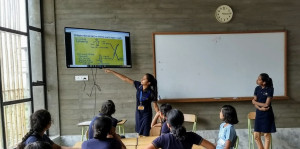Albert Einstein famously said that “in the middle of difficulty lies opportunity.” For the organisers of a ground-breaking initiative to engage young people in technology, that has certainly proved true.
When UK schools closed their doors in March, it looked as though the Digital Explorers events - in which hundreds of young people from under-represented communities come together every year to learn about technology and get an insight into careers in the field - would have to be cancelled.
But technology came to the rescue. The programme has been reinvented as a series of virtual digital events by the organisers, Tata Consultancy Services (TCS). And because Digital Explorers has gone virtual, the number of young people taking part has soared.
Freed from the physical constraints of bricks and mortar venues, 7,000 young people from all over the country have signed up for the first event starting on 29 June.
The future talent pool
Digital Explorers was launched in 2017 with pilot events in different locations across the UK as a new way of providing experience and insight of the world of work.
Catering to 500 – 700 students per physical event, the scheme has expanded to multiple venues across the UK and is run as a free five-day, hands-on learning programme to engage girls and young people from under-represented communities in science, technology, engineering and mathematics (STEM).
Participants encounter technologies like Artificial Intelligence, the Internet of Things, Big Data and get to do their own coding. The programme focuses on the young peoples’ futures, teaching the digital skills to enhance their employability.
Virtual experiences
Faced with the challenge of continuing the programme in lockdown, TCS had a solution at hand - the TCS iON Digital Glass Room™ platform which has already been made available free of charge to schools across the globe to enable them to continue teaching.
Using the platform to deliver Digital Explorers was a natural extension of this free offer to schools. The secure, user-friendly platform allows students to interact without barriers of geography and to share ideas and projects in real time.
In the first of the virtual Digital Explorers events, participants from school years seven to nine (ages 11-14) will have a week to work together and deliver their projects. TCS volunteers from around the world, as well as the UK, will be able to join in for the first time.
Delivered in partnership with the Engineering Development Trust, the first event will feature live hosts, guest speakers (live and pre-recorded) as well as mentors from TCS. The second event – which starts on 13 July – is for students aged 16 or 17.
This event is being run in partnership with MyKindaFuture, whose Connectr™ platform is designed to allow mentors to interact with and support people early in their careers. Participants will also be able to use forums to share and compare ideas.
There are also plans to allow young people without access to the internet or a laptop to receive course materials on paper, although these are still to be finalised.
Impressing young minds
The results of Digital Explorers events to date have been impressive. Eight out of 10 young people who have taken part say it has made them more interested in STEM subjects.
Camilla Carlslund, Corporate Sustainability Officer at Tata Consultancy Services, says the programme aligns perfectly with TCS’ objectives. “Our aim is to really inspire students to take a career in STEM and even more so to bring them into our pipeline,” she says. “We’ve had some graduates join us who have taken part in Explorers or workshops that we’ve run in schools.”
The need to bridge the IT skills gap by encouraging young people to pursue a STEM career is becoming ever more urgent, with demand for jobs outstripping supply.
There is also a real lack of diversity within the sector. Only 13% of the STEM workforce in the UK are women, while just 6.2% of UK domiciled students studying STEM subjects at British universities are black. And Digital Explorers is determined to help redress this imbalance.
Does the success of the virtual events mean they may replace face to face gatherings after the pandemic is over? Carlslund says virtual events offer a solution for young people in areas of the UK like the Scottish Highlands where travel times may make it harder to take part in physical events.
Whatever the future holds, Digital Explorers is going ahead thanks to purpose-driven technology which has demonstrated that, whatever the difficulty, it can be overcome.

